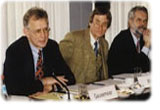Outlining the Future
Perspectives on Societal Development in the 21st Century
Workshop, March 23, 1999, CAP, Munich
Summary
Program
Participants
Word-Download: Executive Summaries, Program, List of Partipants.
|
Outlining the Future Perspectives on Societal Development in the 21st Century Workshop, March 23, 1999, CAP, Munich Summary Program Participants Word-Download: Executive Summaries, Program, List of Partipants. |
|||||
| |
Prof. Dr. Jürgen Gausemeier New Means of Product Development An Example of Scenario Management in Production Strategies for the 21st Centurys  Like Karlheinz Steinmüller, Professor Jürgen Gausemeier of the Heinz Nixdorf Institute presented a study that was based on a concrete case, in this instance, industrial production in Germany. In the first step, partial scenarios were developed for four fields: companies, economic-geopolitical, technical, and socio-political. This meant finding key factors that had a particularly strong influence on product development in German. (The institute settled on 56, including wage costs of product developers and cooperation with universities.) For each key factor, possible developments were devised, so-called future projections. Each factor had two or three future projections with a time horizon of 2010. At the end of this process, each field had two to four raw scenarios. These eleven partial scenarios were then checked to see how well they fit with one another, eventually coalescing into three scenarios that sketched the possibilities for product development in Germany over the next ten years. Scenario A: Germany as a successful competitor in the global information age Scenario B: Germany as a key niche player in the global information age Scenario C: Germany as a loser in the global information age These scenarios served as the foundation for formulating a vivid concept for product development in Germany to take as a model. The concept was called "Ensuring the Future through Strong Innovation" and was clearly differentiated from scenario B. The key difference was that a strategically successful position resulted from a number of interrelated factors (e.g., increased access to venture capital, tax concessions for new technology firms) that the concept could help to bring about. |
||||
Project Background | Events | Reports and Essays Zukunftszeugen | Contact Us | Home Page Last Modified: 2002-04-23 TOP |
|||||